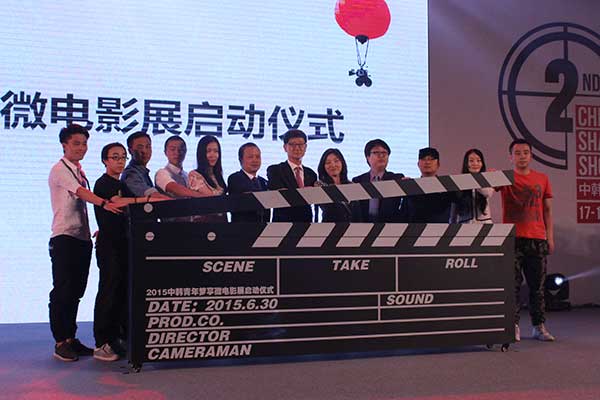 |
|
The opening ceremony of the Chinese Korean "Share Your Dream" Short Film Festival is held in Dachang county, Hebei province, on Tuesday. The annual event provides a platform for cooperation between filmmakers from the two countries.[Photo by Wang Kaihao/China Daily] |
The Korean company established the festival as a potential incubator of ideas and projects for young Chinese filmmakers. Apart from the festival's competition section, this year, people will be taught special effects, post-production and stage design, according to the organizers. And, next year, South Korean training courses will be introduced.
"The fast-growing film industry in China has created a marvelous market," says Cho Gun-ryong, a general manager of strategic cooperation under CJ E&M China. "The festival will also choose potential talents to participate in our (Korean) film production."
Cho says the entertainment colossus wants to do more than charity.
"Short films are only a means to prove their capability, and they will need more concrete support," he says of the young Chinese.
In 2014, cultural authorities from China and South Korea signed an agreement to encourage closer cooperation between the two industries.
In January, Miss Granny, a Chinese-language fantasy film adapted from CJ E&M's original production by the same title in English, made nearly 400 million yuan from Chinese cinemas.
"But this film was only a transitional test," Cho explains the reason why local expertise in China is urgently needed by his company. "We will produce two to three films targeting Chinese filmgoers in the next few years."
CJ E&M will possibly cooperate with Chinese film conglomerates to produce history-themed and sci-fi films in the near future, he says. But he doesn't give information on any specific project.
CJ E&M entered the Chinese market in 2006, and now runs 48 cinemas in 26 cities on the mainland.
Cho predicts there will be 100 cinemas by the end of 2016, and 200 more to be built within the next three years. He believes that will help South Korea's biggest film company to gradually climb to the top of the Chinese market.
"Similar cultural backgrounds of China and South Korea, like the common homage for Confucius, has nurtured similar values among film audience in both countries. That creates more possibilities for the big screen," Cho says.